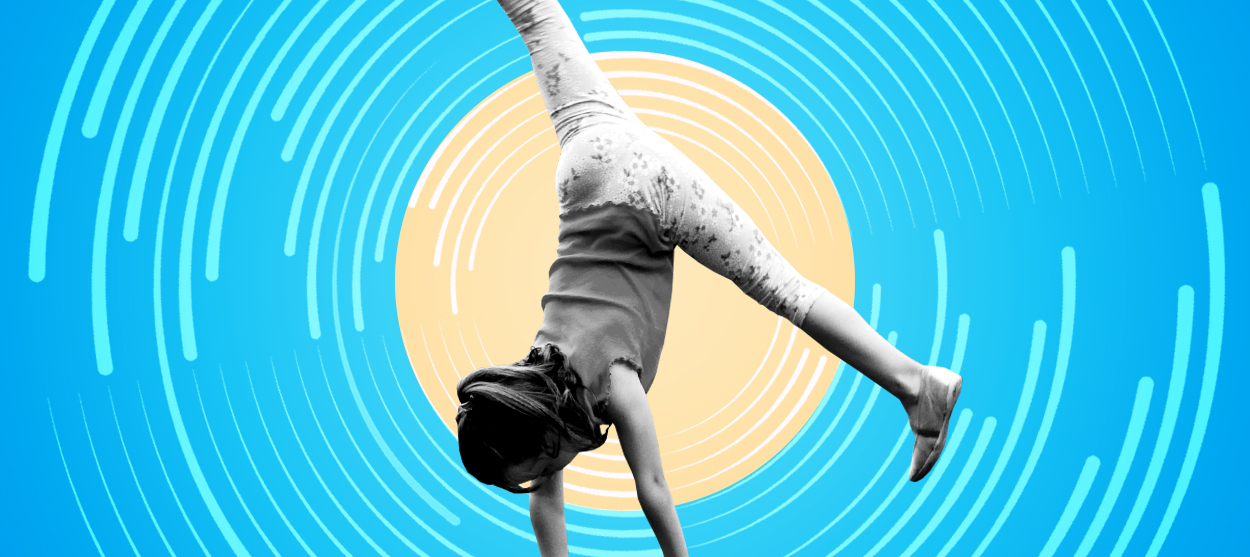The joy and sadness of being surpassed by your kids
My kid can do a cartwheel. Why am I so sad about it?


A free daily email with the biggest news stories of the day – and the best features from TheWeek.com
You are now subscribed
Your newsletter sign-up was successful
My 6-year-old learned to do a cartwheel last week. I have never been able to do a cartwheel, and I never will. For most of my preteen years, trying to spin my splayed body 360 degrees occupied most of my spare time. Yet on each attempt, without fail, my feet, knees, and hips fell shy of their intended trajectory and thudded to the floor. And with every flop, I felt my frustration soar while my self-confidence and body image shriveled a tiny bit.
But my daughter has it down. This, I'm fairly certain, is the first time one of my children has learned to do something I absolutely cannot — and it won't be the last. As I pulled out my phone to film her joyfully rotating, I was elated. I was probably more excited by her acquisition of this useless but gratifying skill than she was. But in the background, other emotions — mild sadness and inadequacy — flickered. Because as much as we want our kids to do better than us, when they go right ahead and succeed at something we desperately wanted to be good at growing up but weren't, it underlines our shortcomings. Those largely locked down feelings of failure from childhood are suddenly on a comeback tour of your brain.
Don't get me wrong. I want my children to be better than me at everything, from school work to compassion. But with our kids' successes comes a level of parental discomfort. What was missing from my genetics and upbringing, I wondered, that meant I couldn't achieve this (however trivial) feat? These are ugly, uncomfortable feelings. It's embarrassingly petty and trite to look at a gymnastically inclined child, gloriously blissed-out by her achievement, and wonder why this couldn't have been you. It's not a reaction I feel good about, but I also don't think I should ignore it. Pretending that our kids outdoing us is a purely joyful occurrence is dishonest.
The Week
Escape your echo chamber. Get the facts behind the news, plus analysis from multiple perspectives.

Sign up for The Week's Free Newsletters
From our morning news briefing to a weekly Good News Newsletter, get the best of The Week delivered directly to your inbox.
From our morning news briefing to a weekly Good News Newsletter, get the best of The Week delivered directly to your inbox.
It's how parents handle this discomfort that counts — at least I hope it is. I've told my daughter, breezily, that I couldn't do these things as a kid and I think that's spurring her on. She doesn't, at least so far, seem disquieted by my athletic inadequacies.
Of course, we never receive our children's emerging strengths — or weaknesses — neutrally. We also feel frustration and even anger when our kids don't do well at something we're good at. Parents can't help but see all of it through the lens of their own childhood and their warped adult expectations. But again, it's what we do with these uncomfortable, irrational feelings that will decide how it plays out. Insisting that your kids need to do better at something you're good at will knock their self-esteem or make them want to give up altogether.
I know this because it happened to me. I couldn't and still haven't mastered spelling, and foreign languages are not my thing. This drove my parents crazy because they considered themselves to be proficient linguists and exceptional spellers. They'd try to fix me, and when it inevitably didn't work, I was made to feel inadequate, and like I wasn't trying hard enough. The idea that their child might not possess, or couldn't acquire, these skills simply hadn't occurred to my parents.
I thoroughly and openly resented all of this right up until I had kids of my own. Now, I still think my parents handled my poor spelling and failure to grasp the French language badly, but I also know that so much about raising kids is about balancing multiple complicated emotions about the same thing.
A free daily email with the biggest news stories of the day – and the best features from TheWeek.com
We're programmed to look for parallels between our offspring and ourselves, so any deviation is jarring. Expecting your own abilities to emerge in your children isn't so very different from waiting for a newborn's blue eyes to morph into the family brown. If the eyes stay blue, then this is a thing that will get noticed and talked about, probably for years. Similarly, when alien skills and deficiencies creep through, it often doesn't feel right to us. It's disconcerting to be a sporty family and produce a child who can barely throw a ball, or vice versa.
While we parents can't rewrite this programming, we can fight it. Seeking to update our evolutionary instincts with our acquired on-the-job experience and wisdom is the essence of emotionally intelligent child rearing. Understanding and accepting that our kids are not our facsimiles should probably be covered in those classes that also teach expectant couples infant CPR and weaning.
Now, my daughter is working on handstands in the living room, and while I still have the odd envy pang, I'm also her biggest cheerleader. And I'm excited to see what else this child of under-evolved klutzs will do with her wonderfully alien skillset.
Want more essential commentary and analysis like this delivered straight to your inbox? Sign up for The Week's "Today's best articles" newsletter here.
